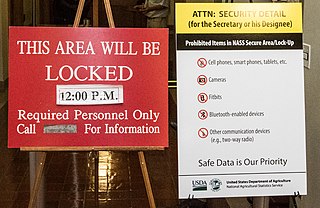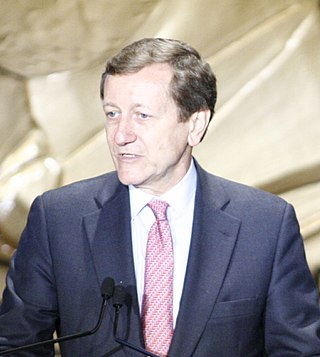
Nicholas Berthelot Lemann is an American writer and academic, and is the Joseph Pulitzer II and Edith Pulitzer Moore Professor of Journalism and Dean Emeritus of the Faculty of Journalism at the Columbia University Graduate School of Journalism. He has been a staff writer at The New Yorker since 1999. Lemann was elected to the American Philosophical Society in 2022.
News style, journalistic style, or news-writing style is the prose style used for news reporting in media, such as newspapers, radio and television.
Journalism scandals are high-profile incidents or acts, whether intentional or accidental, that run contrary to the generally accepted ethics and standards of journalism, or otherwise violate the 'ideal' mission of journalism: to report news events and issues accurately and fairly.
Investigative journalism is a form of journalism in which reporters deeply investigate a single topic of interest, such as serious crimes, racial injustice, political corruption, or corporate wrongdoing. An investigative journalist may spend months or years researching and preparing a report. Practitioners sometimes use the terms "watchdog reporting" or "accountability reporting".
Infotainment, also called soft news as a way to distinguish it from serious journalism or hard news, is a type of media, usually television or online, that provides a combination of information and entertainment. The term may be used disparagingly to devalue infotainment or soft news subjects in favor of more serious hard news subjects. Infotainment-based websites and social media apps gained traction due to their focused publishing of infotainment content, e.g. BuzzFeed.
Journalistic objectivity is a principle within the discussion of journalistic professionalism. Journalistic objectivity may refer to fairness, disinterestedness, factuality, and nonpartisanship, but most often encompasses all of these qualities. First evolving as a practice in the 18th century, a number of critiques and alternatives to the notion have emerged since, fuelling ongoing and dynamic discourse surrounding the ideal of objectivity in journalism.
Journalistic ethics and standards comprise principles of ethics and good practice applicable to journalists. This subset of media ethics is known as journalism's professional "code of ethics" and the "canons of journalism". The basic codes and canons commonly appear in statements by professional journalism associations and individual print, broadcast, and online news organizations.
Media ethics is the subdivision of applied ethics dealing with the specific ethical principles and standards of media, including broadcast media, film, theatre, the arts, print media and the internet. The field covers many varied and highly controversial topics, ranging from war journalism to Benetton ad campaigns.
Watchdog journalism is a form of investigative journalism where journalists, authors or publishers of a news publication fact-check and interview political and public figures to increase accountability in democratic governance systems.

Science journalism conveys reporting about science to the public. The field typically involves interactions between scientists, journalists and the public.

In journalism and public relations, a news embargo or press embargo is a request or requirement by a source that the information or news provided by that source not be published until a certain date or certain conditions have been met. They are often used by businesses making a product announcement, by medical journals, and by government officials announcing policy initiatives; the media is given advance knowledge of details being held secret so that reports can be prepared to coincide with the announcement date and yet still meet press time.
Chequebook journalism is the controversial practice of news reporters paying sources for their information. In the U.S. it is generally considered unethical, with most mainstream newspapers and news shows having a policy forbidding it. In contrast, tabloid newspapers and tabloid television shows, which rely more on sensationalism, regularly engage in the practice. In Britain and throughout Europe, journalists paying for news is fairly common.

Tabloid journalism is a popular style of largely sensationalist journalism which takes its name from the tabloid newspaper format: a small-sized newspaper also known as half broadsheet. The size became associated with sensationalism, and tabloid journalism replaced the earlier label of yellow journalism and scandal sheets. Not all newspapers associated with tabloid journalism are tabloid size, and not all tabloid-size newspapers engage in tabloid journalism; in particular, since around the year 2000 many broadsheet newspapers converted to the more compact tabloid format.

Brian Elliot Ross is an American investigative journalist who served as the Chief Investigative Correspondent for ABC News until 2018. He reported for ABC World News Tonight with David Muir, Nightline, Good Morning America, 20/20, and ABC News Radio. Ross joined ABC News in July 1994 and was fired in 2018. His investigative reports have often covered government corruption. From 1974 until 1994, Ross was a correspondent for NBC News.
Chitra Subramaniam Duella is an Indian journalist. She is recognized in India for her investigation of the Bofors-India Howitzer deal which is widely believed to have contributed to the electoral defeat of former prime Minister Rajiv Gandhi in 1989. She founded CSDconsulting, a Geneva based specialised consultancy working in the area of public health, trade policy, development directions and media. She is also the co-founder and Managing Editor of The News Minute – an online news website. She was an Editorial Adviser for Republic TV of Arnab Goswami. In 1989, she was honoured with the Chameli Devi Jain Award for Outstanding Women Mediaperson.
Collaborative journalism is a growing practice in the field of journalism. One definition is "a cooperative arrangement between two or more news and information organizations, which aims to supplement each organization’s resources and maximize the impact of the content produced." It is practiced by both professional and amateur reporters. It is not to be confused with citizen journalism.

Russ Baker is an American author and investigative journalist. Baker is the editor-in-chief and founder of the nonprofit news website WhoWhatWhy. Earlier in his career he wrote for a variety of publications, including The New York Times Magazine,The New Yorker, The Washington Post, Esquire,Vanity Fair, The Christian Science Monitor, The Nation, The Guardian, Wired, and The Village Voice.
Neville Thurlbeck is a British journalist who worked for the tabloid newspaper News of the World for 21 years. He reached the position of news editor before returning to the position of chief reporter. Thurlbeck was arrested in April 2011 as part of Operation Weeting. Later Thurlbeck was among four ex-News of the World journalists to plead guilty to phone-hacking and was jailed along with Greg Miskiw. The newspaper’s former editor Andy Coulson was also jailed after a jury found him guilty. Before the News of the World, Thurlbeck worked as a reporter for the Today newspaper, as deputy news editor of the Western Mail and as chief reporter for the Harrow Observer.
Data journalism or data-driven journalism (DDJ) is journalism based on the filtering and analysis of large data sets for the purpose of creating or elevating a news story.
Annika Smethurst is an Australian journalist. She is the state political editor for The Age newspaper in Melbourne.





